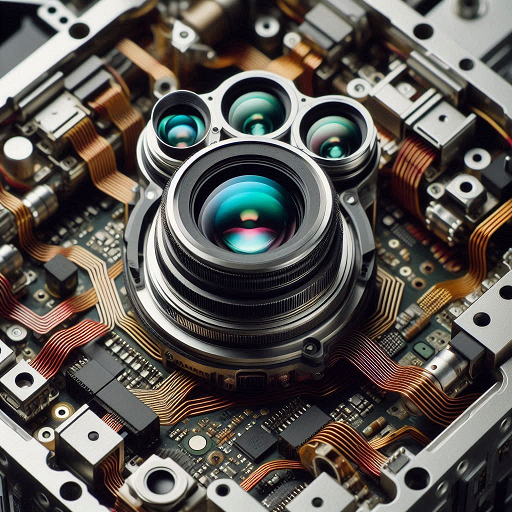The camera modules industry is evolving rapidly, driven by advancements in technology and increasing demand across various sectors, including consumer electronics, automotive, and healthcare. As camera modules become more integral to modern devices, understanding the trends, growth factors, key players, opportunities, and challenges in this industry is essential for stakeholders aiming to stay ahead in the market.

Trends Shaping the Camera Modules Industry
- Miniaturization and Integration: The trend towards smaller, more integrated camera modules is driven by the demand for sleek and compact devices. Innovations in lens technology, sensor size, and chip integration are making it possible to pack high-quality imaging capabilities into smaller form factors.
- Advanced Imaging Technologies: The adoption of advanced imaging technologies, such as depth sensing, multi-camera setups, and augmented reality (AR), is transforming how camera modules are used. These technologies enhance image quality, provide better focus and depth perception, and enable new applications.
- AI and Machine Learning: Integration of artificial intelligence (AI) and machine learning in camera modules is improving image processing, enabling features like real-time object recognition, facial recognition, and enhanced low-light performance.
- Higher Resolution and Frame Rates: With the demand for higher resolution and faster frame rates growing, camera modules are being developed with higher megapixel counts and improved processing capabilities to support 4K and 8K video recording.
- Enhanced Connectivity: The rise of IoT and connected devices is driving the need for camera modules that support seamless connectivity with other devices and networks, including Wi-Fi, Bluetooth, and 5G.
Growth Factors in Camera Modules Industry
- Rising Demand in Consumer Electronics: The proliferation of smartphones, tablets, and wearables is a significant driver of growth in the camera modules industry. As these devices become more advanced, the demand for high-quality camera modules increases.
- Automotive Industry Growth: The automotive sector is increasingly incorporating camera modules for advanced driver-assistance systems (ADAS), autonomous driving, and enhanced safety features. This growing application is fueling demand for high-performance camera modules.
- Healthcare Applications: In healthcare, camera modules are being used in medical imaging, endoscopy, and telemedicine, expanding the market opportunities for these components.
- Technological Advancements: Continuous advancements in sensor technology, optics, and image processing are creating new opportunities for innovation and growth in the camera modules industry.
Top Companies in the Camera Modules Industry
- Sony Corporation: A leading player in the camera module market, Sony is known for its high-quality imaging sensors and advanced technology.
- Samsung Electronics: Samsung is a major manufacturer of camera modules, providing solutions for various applications including smartphones, automotive, and security systems.
- OmniVision Technologies: OmniVision is renowned for its image sensors and camera module solutions, catering to a wide range of industries from consumer electronics to automotive.
- LG Innotek: LG Innotek specializes in advanced camera modules and is a key supplier to major smartphone manufacturers.
- STMicroelectronics: STMicroelectronics provides innovative camera module solutions with a focus on automotive and industrial applications.
Camera Modules Industry Opportunities
- Expansion in Emerging Markets: Growing consumer electronics adoption in emerging markets presents significant opportunities for camera module manufacturers to expand their reach.
- Innovative Applications: New applications in areas such as AR/VR, smart homes, and robotics are creating new market opportunities for camera modules.
- Strategic Partnerships and Collaborations: Forming partnerships with technology companies and exploring collaborations can help camera module manufacturers innovate and access new markets.
Camera Modules Industry Challenges
- Cost Pressures: The need for continuous innovation and high-quality components can drive up costs, posing a challenge for manufacturers to maintain profitability while offering competitive pricing.
- Supply Chain Disruptions: The camera module industry can be affected by supply chain disruptions, including shortages of raw materials and components, impacting production and delivery.
- Rapid Technological Changes: Keeping pace with rapid technological advancements requires substantial investment in research and development, which can be challenging for some companies.
- Regulatory and Compliance Issues: Navigating regulatory requirements and ensuring compliance with industry standards can be complex and vary by region.
